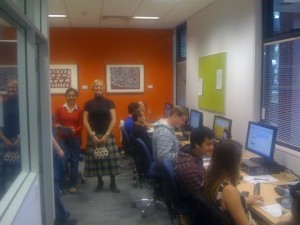Here at iC with Prof. John Glynn and Asslam Umar Ali regarding getting the best out of blogging.
Category Archives: How hard is it?
Looking for Some blogs to read? Try these….
BiologyHub – Open access blog network of courses focused on the population biology of bacteria and viruses
Sydney Uni Parralax – Parallax records the experiences of final year students of the B.A.(Media & Communications) degree who have won competitive overseas internships to work in Asian media organisations.
VC Macquarie – Blog of Professor Steven Schwartz, Vice-Chancellor of Macquarie University (Sydney).
Cornell wine & research – Cornell University, news and events from the Viticulture and Enology Major
Blogging Forum presentations
Here is a link to Sue’s presentation, saved as PDF:
Sue Water’s presentation 20th March 2012
Get along to the blogging forum on 20th march…
11 advantages of using a blog for teaching
Can i learn to conduct online?
Whilst on holidays I wondered if anybody offered a diploma or certificate course focusing on conducting music ensembles, since I’ve been doing a lot of that lately, and I’m mostly self taught. I did find a few options – including a Masters level program at the Sydney Conservatorium (that the University of Sydney these days), and also a few overseas. I also found a place that offers Certificate level courses, fully online, in a huge range of music topics including arranging, orchestration, composition. And then i began to wonder, could i learn music online? I think of it as a pretty ‘hand’s on’ activity.
Today, as i read Prof. Steven Schwarz’s blog (VC of Macquarie University) posting regarding the disruptive powers of open education – i discovered Udacity – a new online university that has just started offering free courses, with many more planned. They are currently offering a course called “CS373: Programming a Robotic car” On the webpage, you can see a YouTube clip of the teacher riding in his fully robotic car – the thing was driving by itself!!! And he reckons he can teach me how to do the same in 7 weeks. Yes please! I mean, this really got my inner-nerd very excited.
But seriously, if i can learn to program a robotic car online, then i reckon i probably can learn to conduct online. And arrange compositions for orchestras.
Which one should i try first? Has anybody learnt anything fully online lately?
iPads for in-lecture polling
Uni of Adelaide iPads for in-lecture polling. Whist “clickers” faltered due to the need for students to all have one, this simple but clever solutions means the students just put their hand up, and only the lecturer needs the iPad.
See page 13 for the article
Oui oui! Le Skype is working!

After months of planning and testing, the Skype pilot kicked off today. With slick new high definition web cams, and the help of the “how to” login sheet, the french language students connected with other students in Noumea. And the French conversations began to flow.
While many staff members have had Skype installed and working fine in their offices on their individual managed desktop machines (ie supported centrally by ITS), up until know it has been impossible to intall and use them “en masse” for use by students in an ITS managed teaching computer lab. But, thanks to the hard work of everybody involved (especially Krstan Risteski, ITS Labs Manager and Liz Burns, ITS System team) a special ‘software package’ was developed, tested, tweaked, and re-tested. Now Skype can be remotely installed in labs by ITS Support staff, with the correct network and software settings so that it actually works within the confines of a teaching lab. The only last minute hitch was that each new web-cam purchased by Arts (they are for use in the new Bld 19 Language labs) needed to have the software drivers manually installed, but thanks to Krstan, this was achieved in time also.
Android app for wordpress

Here is a sweet little andtoid app to blog from your mobile, check out wordpress from the market 🙂 w
OpenSource software in labs: pilot progress
This pilot project over in the new Digital Media Centre labs at iC is going very well. Ably supported by lab support technician Glenn Alexander, research into tweaking the lab setup is underway to ensure that when students logoff in the labs their software is re-set to an appropriate “clean-slate settings” state on the shared lab machines, and their data is saved on their USB or portable hard-drives.
I visited the class yesterday in person, and saw the colour animated graphics that the students were creating in the Ubuntu/Linux operating system using the Scala programming language. Look forward to seeing how the student projects develop.

